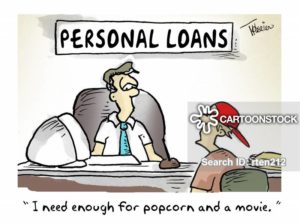November 24, 2020
 A personal loan is money that is borrowed for your personal purpose which mainly includes debt consolidation, student loan, unexpected medical bill or even buying a new appliance. The money is returned by you with interest in monthly installments from time to time which usually lasts from two to five years. As has been seen, nowadays most of the personal loans are unsecured which means that they are not backed up by the collateral. APR is known as the annual percentage rate which determines the interest you pay on that loan. There is no fixed APR and may vary from scenario to scenario but it ranges from around 6% to 36% with an average of around 9.41%. APR depends upon your income, credit score, debt, and creditworthiness. If you were looking to apply for a personal loan and didn’t know how to apply for it then you have come to the right place. This article will guide you through how to apply for a personal loan.
A personal loan is money that is borrowed for your personal purpose which mainly includes debt consolidation, student loan, unexpected medical bill or even buying a new appliance. The money is returned by you with interest in monthly installments from time to time which usually lasts from two to five years. As has been seen, nowadays most of the personal loans are unsecured which means that they are not backed up by the collateral. APR is known as the annual percentage rate which determines the interest you pay on that loan. There is no fixed APR and may vary from scenario to scenario but it ranges from around 6% to 36% with an average of around 9.41%. APR depends upon your income, credit score, debt, and creditworthiness. If you were looking to apply for a personal loan and didn’t know how to apply for it then you have come to the right place. This article will guide you through how to apply for a personal loan.
How To Qualify For A Personal Loan
There are many things and steps that shall be kept in mind in order to qualify for a personal loan. For example, if a person wants to borrow a loan for remodeling his house or buying a new car, then the equity loan would surely come with a lower interest rate. These are not like unsecured personal loans as you are not solely judged on creditworthiness. On the other hand, these instant cash loans are secured by the home you want to remodel or the car you want to buy.
Decide How Much To Borrow
One should be definite enough to determine how much exact money that he needs to borrow. One should definitely keep in mind that you don’t need to just repay the original loan but you have to repay along with the interest. A sane person would not borrow extra money just so that he would pay interest on money that he would not need. This is the reason why you should decide on how much money to borrow. One should also make sure that he would be able to afford the payment with all the interest including. It has been seen that in many cases, people opt for way too high instant cash loans and are unable to pay back in the end which not might end up good.
Check Your Credit
It is of no surprise that instant cash loans heavily rely on creditworthiness. One should check their credit scores and should obtain the credit reports from each of the three major credit reporting agencies such as Equifax, TransUnion, and Experian. Referred to as soft inquiries, none of these actions will impact your credit score. It will only impact when you apply for a loan and lenders opts for a hard inquiry. There are many credit card and loan companies out there which provide free monthly credit score which is found beneficial for applying for an instant cash loan.
Tags:
budgeting,
credit,
economy,
Interest Rates,
loans,
money,
Mortgage interest rates,
personal finance
November 22, 2020
 Although many people think saving and investing are very similar to one another, there are some key differences.
Although many people think saving and investing are very similar to one another, there are some key differences.
By being aware of those differences you may change your mind when deciding which action to take.
We listed some pros and cons of both saving and investing to help you to weigh which is the better solution for you.
Similarities and differences between saving and investing
The thing that connects the two is that they are both strategies to accumulate money! Saving or investing both imply putting your money aside for potential future needs.
They can both protect you from debt. However, if you find yourself in that situation, be active in the process and claim Payment protection insurance if needed.
The difference between the two is the type of assets used in the account.
Another one is that if you want to be able to use the cash quickly, save (but it can also be done for some long-term future plans).
If you don’t want to play it safe and your desire is achieving a higher return – invest!
Where to go?
Savers – go to a bank or a credit union and open a saving account. When opening a saving account, look for the APY (highest annual percentage yield) to maximize your earnings.
Investors – open an account with an independent broker, which includes mutual funds, bonds, stocks and exchange-traded funds. Also, keep in mind when investing that you should invest only the money you won’t be needing any time soon.
You should keep your funds in the investment for at least 3 to 5 years minimum.
Are there some risks?
While investing, you should always think twice before doing something. Saving is safe with the minimum amount of risk – it is very easy to do and the chance of losing money is equal to zero.
You are always familiar upfront with how much you will earn in your balance.
On the other hand, investing is always unpredictable and you have to be aware of the risk of potentially losing everything, but also of earning a lot more!
When talking about risk, the thing that needs to be mentioned is the price of saving and investing. Saving is not expensive, since opening an account is free.
But, you have to keep in mind some unpredictable factors such as inflation. Saving doesn’t protect you from it, while investing potentially can save you (if you think in a long-term period).
How should I decide whether I should save or invest?
This decision should be based on your wishes and needs.
If you’re looking for earning money and taking risks that can possibly have very good or very bad consequences, you should invest.
If you are thinking about putting some money aside just in case you might need it someday and you want to be able to use your money whenever you need it, you should save.
This decision is not always easy. Thinking it thoroughly, make the best decision for yourself. It can be a lot easier than you think – contact Optimal Solicitors in Manchester, they know what to do!
Tags:
budgeting,
Earnings,
financial planning,
income,
insurance,
investments,
money,
personal finance,
savings
November 10, 2020
 In most cases, buyers’ offers have home inspections contingencies included. This means that, in making a deal, you have the right to inspect the property and, if needed, back out of the deal if the results are unsatisfactory.
In most cases, buyers’ offers have home inspections contingencies included. This means that, in making a deal, you have the right to inspect the property and, if needed, back out of the deal if the results are unsatisfactory.
Wanting an inspection shows you are a serious buyer so it can never be a bad idea.
Located in Šibenik, Terra Dalmatica offers you a hand in finding your perfect home! Giving every client an individual approach, we can together discover an ideal solution for you.
The condition of a home
Before the final answer, you have to be aware of repairs and costs your future home may require. Safety comes first, right?
Detecting problems such as carbon monoxide, radon or mould can be crucial in cancelling your offer.
Thinking ahead can save you from surprises and unforeseen legal problems.
Every room in your house needs a proper permit, otherwise, it can affect your taxes and insurance.
A space for improvement
Exercising your right for a home inspection leaves you the space to negotiate for a better deal or price reduction. Diagnosing the current condition of water heater, plumbing, and other installations helps you make budget plans.
Stick to your criteria and determine a cost over which you are not willing to go. Don’t purchase a home that is in the condition you are not personally satisfied with!
Trust a home inspector
A home inspector is your person of trust. He or she is a professional who can help and suggest some future actions – saving time and money, maintaining your home etc.
Buying a home can be one of the biggest steps in your life so don’t underestimate the importance of all the nuances of your home’s picture.
Be aware of the chance that, even though your home has the perfect colour walls and is in the perfect distance from your work, it may hide a lot deeper problems.
Insurance
By skipping a home inspection you can find yourself in a position in which you may not get some certification or documentation needed for home insurance.
This is why a home inspector plays an important role in your future!
Be responsible
If you buy a home without previously inspecting it, there is not much to do about it at this point.
Home inspections cost around 200-500$ – paying this amount can protect you from potentially a lot bigger costs in the future.
Should you skip a home inspection? No!
The reasons above give you an unambiguous answer – never skip a home inspection!
The risk from setting your money for home inspection aside, even if it turns out everything in your home is in a perfect condition, is much smaller than the risk of not being prepared for greater amounts of money you may pay for repairs your home might need.
The decision you make should be based on your wishes and standards – the professionals in Terra Dalmatica are always at your disposal. Find your perfect home – make all your wishes come true!
Tags:
budgeting,
economy,
Home Insurance,
loans,
money,
mortgage,
real estate
March 24, 2020
 Many businesses nowadays require equipment and some of them are a way to expensive. It is possible that the owner may be able to afford the cost of equipment but many times the equipment is way too expensive. Due to this small business loans are available which not only provides equipment to the owner but also provides them time to pay them back easily. Equipment loans are simple, fast and can reduce one’s stress. Though the process is simple one should keep some things in mind when taking equipment loans. If you are looking for the things to keep in mind before taking an equipment loan, then this article has got you covered.
Many businesses nowadays require equipment and some of them are a way to expensive. It is possible that the owner may be able to afford the cost of equipment but many times the equipment is way too expensive. Due to this small business loans are available which not only provides equipment to the owner but also provides them time to pay them back easily. Equipment loans are simple, fast and can reduce one’s stress. Though the process is simple one should keep some things in mind when taking equipment loans. If you are looking for the things to keep in mind before taking an equipment loan, then this article has got you covered.
Choose the equipment which right for you
One should always do his research about different types of equipment and it can be new or even used. Spending time in the market can lead to intense survey and one could be clearer about his equipment. One would also know which equipment would be better for his particular business while keeping small business loans in mind. All expenses should be taken into the accounts while doing a survey whether it should be costs related to fuel or even repairs. Once all these things are completed then one should get a bill that is of sale for the approval of the loan.
Small business loans or try leasing
As considered, there are mainly two options regarding equipment. The first one is buying the equipment if one has enough capital or the second one to go for small business loans. Leasing is considered to be a better option if the company is a startup or one has the need to change equipment after a few years. Many businesses require equipment that themselves require an upgrade after a few years. For these types of scenarios leasing the equipment is a much better option.
Documentation of small business loans
The lender before lending small business loans looks for some obvious things in the company and one of them is their documentation. The lender has to know about the type of business, the clients you have worked with or the company invoices as well. Some basic documentation includes one’s Identity card, bill of sale, bank statements and corporation papers. If the amount reaches more than $100,000 then further documentation such as financials may also be needed.
Don’t rush while accepting the terms of small business loans
It should be noted that though you are applying and taking small business loans but one should always remain patient while reading and accepting the terms involved. Many people make the mistake of not going through each and every point but regretting it afterward. The terms should be discussed with details before signing the documents. Sometimes it also happens that one doesn’t get the approval for the loan but one should not be disheartened but should always be curious for the reason. The application can be resubmitted and there is a chance that it gets accepted the second time. One should always consider the fact that he should be provided the best or at least a competitive interest rate according to the market. Many good financial lenders provide time to agree to the terms and don’t pressurize the person until unless he is himself satisfied.
Tags:
banking,
budgeting,
Business,
Debts,
economy,
Equipment Loans,
financial planning,
Interest Rates,
loans
February 6, 2020
 You’re never too young to plan for retirement. In today’s busy world, however, developing a retirement plan can be quite daunting. Fortunately, many financial resources make it possible for people to plan for their retirement early enough. Generally, these tools come with advice, great benefits, goals, and progress reports, all at your fingertips.
You’re never too young to plan for retirement. In today’s busy world, however, developing a retirement plan can be quite daunting. Fortunately, many financial resources make it possible for people to plan for their retirement early enough. Generally, these tools come with advice, great benefits, goals, and progress reports, all at your fingertips.
Plan Your Retirement
Retirement planning is simply the process of determining income goals in retirement and the necessary steps to achieve this. This part is important because it inspires you to take charge of your finances.
Knowing exactly what’s draining your purse is vital to planning your retirement. If you’re not sure of what’s emptying your account, what you have left, and at what level of saving you should be for your planned retirement, then you may need digital apps to help you budget and plan accordingly.
Determine A Good Amount For Retirement
When it comes to saving for your retirement, asking a stranger how much is the right amount is like asking a Londoner how much it costs to commute from Chicago to New York. He/she would more than likely reply with some follow-up questions such as “Will you drive or fly?” and “Where are you now?”
In the same vein, when it comes to how much you need to save for retirement, you need to put some things into consideration for effective planning, including:
• Your current financial status.
• Your anticipated retirement lifestyle.
• How much you stand to collect from social security?
• When do you plan to retire?
• Your investment options.
For early retirement, some financial planning experts suggest between 10-15% of your current income. Whether you’re pursuing early retirement or not, the best way to determine your savings level is to create a retirement limit plan and to do the math to see if you’re still on course.
The rule of thumb is that after you’ve calculated what you believe you possibly need during retirement, multiply the amount by 25. For instance, if the amount is $20,000 per annum, you’ll need 25 × 20,000 = $500,000 to retire comfortably. In contrast, if you’ll receive a $5,000 annual pension and another $5,000 in Social Security benefits, you’ll need only half of the $20,000 per year from your savings account. Therefore, you’ll need just $250,000 saved, which is a good amount for retirement.
Set A Guide For Your Retirement
The majority of the news about retirement nowadays is negative – you may have to work longer because Social Security won’t be enough to save you, and with a longer life span, your savings may not last. This sad commentary may spur you to give up and abandon your retirement goals. But, this approach is likely to complicate things in the long run.
The truth is that having an hitch-free retirement isn’t all about being wealthy, but more about investing your assets wisely. The steps you need to consider in formulating an effective retirement strategy include:
1. Setting your retirement goals to include what you wish to achieve and your financial needs.
2. Creating a financial retirement budget to achieve your objectives.
3. Getting online help from professional financial planners, counselors, financial institutions, and digital applications that could help transform your funds into investment vehicles for a financially stable retirement.
Conclusion
Now you’ve got one or two tips to set you up on the way to plan efficiently for your retirement without hiccups. If you’re finding it difficult to draw a proper retirement plan, consider hiring a financial advisor to help you outline your retirement plan and guide you accordingly.
You may also try out digital apps that are sometimes free to use and quite efficient.
However, for those who are not so tech-savvy, selecting the best apps to help plan your retirement early could be difficult since not much information is provided about them in the popular app stores. To this end, we compiled a list of the best applications to help you plan for your retirement.
Apps to help go into early retirement.
While going through the list, you’ll find many useful apps with unparalleled features for your benefits.
Tags:
budgeting,
economy,
Financial Assistance,
investments,
money,
personal finance,
Retirement,
Retirement Planning,
savings
 A personal loan is money that is borrowed for your personal purpose which mainly includes debt consolidation, student loan, unexpected medical bill or even buying a new appliance. The money is returned by you with interest in monthly installments from time to time which usually lasts from two to five years. As has been seen, nowadays most of the personal loans are unsecured which means that they are not backed up by the collateral. APR is known as the annual percentage rate which determines the interest you pay on that loan. There is no fixed APR and may vary from scenario to scenario but it ranges from around 6% to 36% with an average of around 9.41%. APR depends upon your income, credit score, debt, and creditworthiness. If you were looking to apply for a personal loan and didn’t know how to apply for it then you have come to the right place. This article will guide you through how to apply for a personal loan.
A personal loan is money that is borrowed for your personal purpose which mainly includes debt consolidation, student loan, unexpected medical bill or even buying a new appliance. The money is returned by you with interest in monthly installments from time to time which usually lasts from two to five years. As has been seen, nowadays most of the personal loans are unsecured which means that they are not backed up by the collateral. APR is known as the annual percentage rate which determines the interest you pay on that loan. There is no fixed APR and may vary from scenario to scenario but it ranges from around 6% to 36% with an average of around 9.41%. APR depends upon your income, credit score, debt, and creditworthiness. If you were looking to apply for a personal loan and didn’t know how to apply for it then you have come to the right place. This article will guide you through how to apply for a personal loan.




Recent Comments